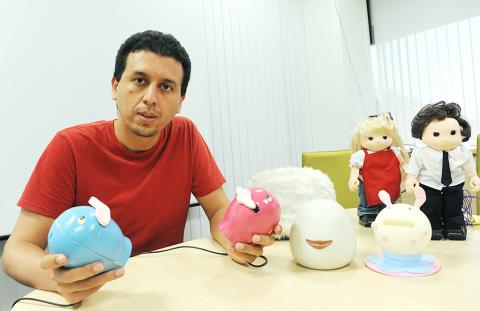Finding it hard to keep up the passion in a long-distance relationship? Help might be on the way.
A robotics professor in Singapore has invented a gadget equipped with motion-sensitive electronic “lips” that allow amorous, but absent couples exchange long-distance smooches via the Internet.
Shaped like a small head with oversize silicon lips, the “Kissenger” — short for Kiss Messenger — was unveiled last month at a scientific conference in Britain and is still being refined for commercial launch.

Photo: AFP
“It can be used between humans to improve their communication,” said Hooman Samani, its creator.
Couples just have to connect the devices to computers via USB cables, link up online and start kissing the silicon material to trigger sensors that move the gadget on the other side.
They can stare at each other on screen while exchanging kisses.
“The main issue is to transmit the force and pressure, and also the shape of the lip,” Samani said.
The “special silicon material” chosen for the lips offers “the best sensation and feeling,” said the scientist, who has personally tested the device.
However, the Kissenger is not yet ready for the market despite “a lot of offers” from interested parties because there are “ethical issues” that need to be resolved on top of the technical aspects, he said.
“Kissing is very intimate so in order to have a product in market which is going to deal with this sensitive issue, we have to do proper studies and investigation on the social point of view, cultural point of view,” he said.
The device is still being refined at a laboratory jointly set up by the National University of Singapore and Keio University of Japan.
Samani calls his field of study “lovotics” — research into the relationship between robots and humans — and the Kissenger is just one of several devices being developed by his team.

Yemen’s separatist leader has vowed to keep working for an independent state in the country’s south, in his first social media post since he disappeared earlier this month after his group briefly seized swathes of territory. Aidarous al-Zubaidi’s United Arab Emirates (UAE)-backed Southern Transitional Council (STC) forces last month captured two Yemeni provinces in an offensive that was rolled back by Saudi strikes and Riyadh’s allied forces on the ground. Al-Zubaidi then disappeared after he failed to board a flight to Riyadh for talks earlier this month, with Saudi Arabia accusing him of fleeing to Abu Dhabi, while supporters insisted he was

‘SHOCK TACTIC’: The dismissal of Yang mirrors past cases such as Jang Song-thaek, Kim’s uncle, who was executed after being accused of plotting to overthrow his nephew North Korean leader Kim Jong-un has fired his vice premier, compared him to a goat and railed against “incompetent” officials, state media reported yesterday, in a rare and very public broadside against apparatchiks at the opening of a critical factory. Vice Premier Yang Sung-ho was sacked “on the spot,” the state-run Korean Central News Agency said, in a speech in which Kim attacked “irresponsible, rude and incompetent leading officials.” “Please, comrade vice premier, resign by yourself when you can do it on your own before it is too late,” Kim reportedly said. “He is ineligible for an important duty. Put simply, it was

The Chinese Embassy in Manila yesterday said it has filed a diplomatic protest against a Philippine Coast Guard spokesman over a social media post that included cartoonish images of Chinese President Xi Jinping (習近平). Philippine Coast Guard spokesman Jay Tarriela and an embassy official had been trading barbs since last week over issues concerning the disputed South China Sea. The crucial waterway, which Beijing claims historic rights to despite an international ruling that its assertion has no legal basis, has been the site of repeated clashes between Chinese and Philippine vessels. Tarriela’s Facebook post on Wednesday included a photo of him giving a

Syrian President Ahmed al-Sharaa on Sunday announced a deal with the chief of Kurdish-led forces that includes a ceasefire, after government troops advanced across Kurdish-held areas of the country’s north and east. Syrian Kurdish leader Mazloum Abdi said he had agreed to the deal to avoid a broader war. He made the decision after deadly clashes in the Syrian city of Raqa on Sunday between Kurdish-led forces and local fighters loyal to Damascus, and fighting this month between the Kurds and government forces. The agreement would also see the Kurdish administration and forces integrate into the state after months of stalled negotiations on